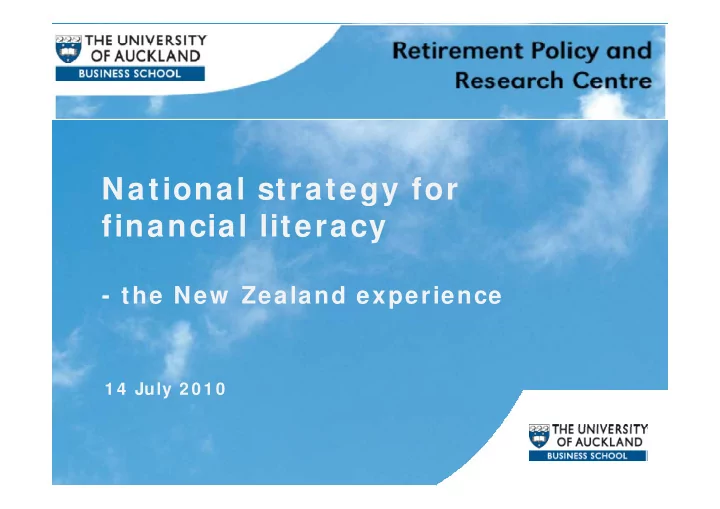

National strategy for National strategy for financial literacy - the New Zealand experience 1 4 July 2 0 1 0
Outline Outline • New Zealand relatively simple environment • Mostly TTE: ‘hands-off’ government approach • Implications of KiwiSaver on behaviour • The Retirement Commission – history and current strategy • The withdrawal by employers? • The ‘National Strategy’ – surveys of financial k knowledge l d • Lessons from New Zealand
NZ pensions landscape : Tier 1 pe s o s a dscape e • ‘New Zealand Superannuation’ – Universal (modest residence requirements): no income or asset tests – Taxed as ordinary income Taxed as ordinary income – State Pension Age is 65 – Non-contributory and was purely PAYG – Relatively generous – Linked to average wages – Virtually eliminated age poverty Virtually eliminated age poverty • No Tier 2 (compulsory saving)
NZ pensions landscape : Tier 3 pe s o s a dscape e 3 • KiwiSaver (since 2007): national, auto- enrolment, opt-out, defined contribution l t t t d fi d t ib ti scheme, tax-subsidised (0.6% of GDP) • All other saving • All other saving – tax neutral (TTE) ‘tax neutral’ (TTE)
New Zealanders’ response? e ea a de s espo se • Probably saving ‘enough’ for retirement • Retirees relatively happy • Little financial hardship amongst 65+ • Relatively high labour force participation rates amongst 65+ (and rising) • Debt-free home plus NZS a good base • ... then we got KiwiSaver
Kiw iSaver Sa e • Influenced by ‘behavioural finance’ studies • National; imposed • Auto-enrolment; opt-out • Tax-subsidised: ‘free’ money • Employer matches employee’s contributions (to 2% of pay) • Employee picks provider and strategy • 35% of eligible New Zealanders are members • Now in third iteration after only three years
The Retirem ent Com m ission e et e e t Co ss o • Recommended by 1992 Task Force • Responsible for: – Financial education so New Zealanders can make “informed decisions throughout their lives” informed decisions throughout their lives – Helping to make government policies “effective and stable” – Helping to ensure the “financial services sector is trustworthy” • Financial literacy a contributor • Financial literacy a contributor
Contributors to financial w ell-being Efficient & effective regulation – Thriving compliance costs economy – minimised i i i d Consumers competitive exercise market and efficient power markets Diversified Personal financial Consumer market for “Financial wellbeing for protection for financial products New Zealanders fraud/ scams capability” bili ” & services Trustworthy only a part Financially financial sector capable with transparent & with transparent & population plain language S ecurity net offerings welfare provision
www.sorted.org.nz www sorted org nz ‘Sorted’ a m ajor initiative e t at ajo So ted a
www.retirement.org.nz Retirem ent Com m ission - research esea c ss o t Co e e et
National Strategy for literacy at o a St ategy o te acy • ‘Network for Financial Literacy’ • http: / / www.financialliteracy.org.nz • Led by the Retirement Commission • “...a range of tactics for improving financial literacy” • Involves public and private sector • Financial Knowledge Surveys – 2006 and 2009 • 2010 Ngai-Tahu Financial Knowledge Survey
Financial Know ledge Surveys a c a o edge Su eys • Face-to-face; 60 minutes; 850 in national samples l • “Knowledge scores” obtained covering: – Mathematical and standard literacy M th ti l d t d d lit – Financial understanding – Financial competence Financial competence – Financial responsibility “...significant improvement in New Zealanders’ overall financial knowledge...”
Know ledge com parisons 2 0 0 6 -2 0 0 9 o edge co pa so s 0 0 6 0 0 9
Lessons from New Zealand esso s o e ea a d • Public pension policy generally of first importance: – Relative strengths of each player – Simple Tier 1 (govt.) – Get rid of tax breaks (govt ) – Get rid of tax breaks (govt.) – Question role of compulsion (govt.) – Move from DB to DC schemes (employer) ( p y ) – ‘Total remuneration’ preferred to ‘Pay + benefits’ (employer) • Information needs require satisfying (all parties) I f ti d i ti f i ( ll ti ) • Financial education (govt., employers)
.... in conclusion Please follow the New Zealand exam ple l
Recommend
More recommend